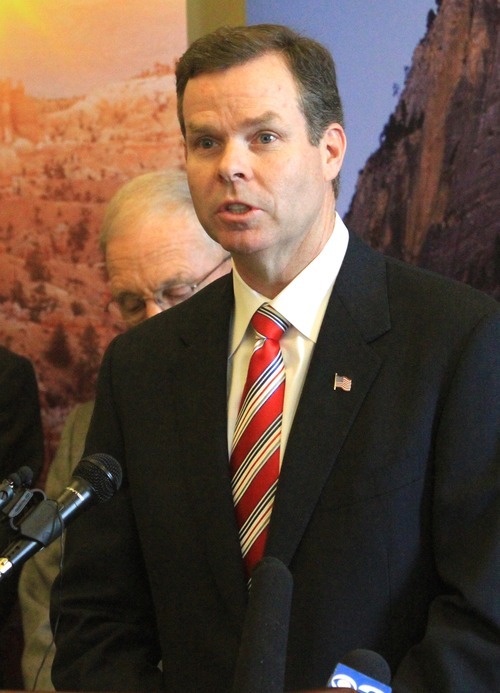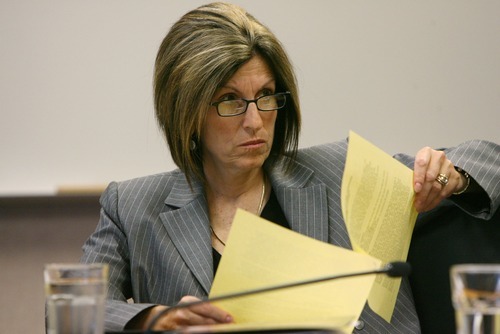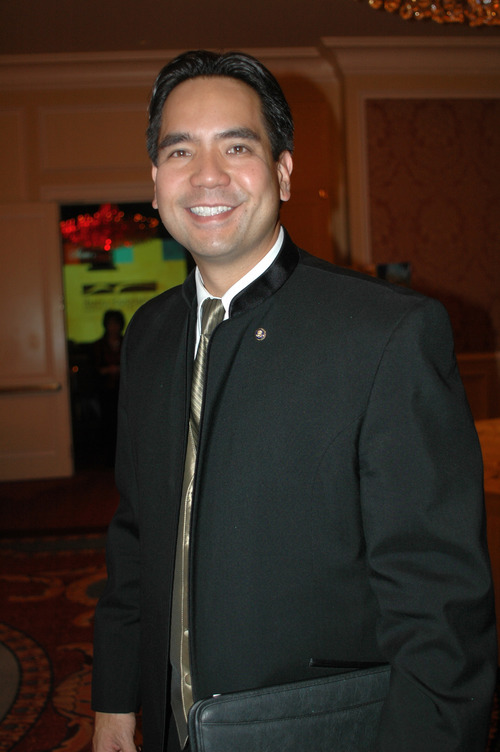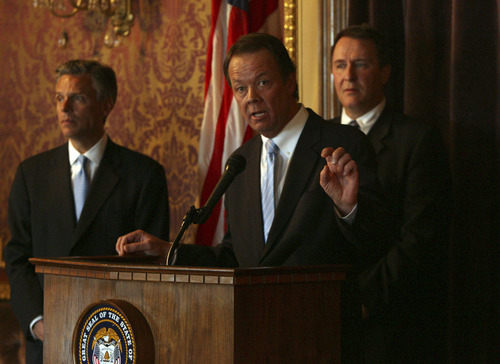This is an archived article that was published on sltrib.com in 2012, and information in the article may be outdated. It is provided only for personal research purposes and may not be reprinted.
Gov. Gary Herbert's office said Friday that he's not interested in restructuring Utah's consumer protection after attorney general candidate John Swallow told a potential donor in trouble with regulators that he would seek to take over the division if he is elected.
Scott Burns, a former veteran Utah prosecutor who has endorsed Swallow's opponent, said it is disturbing that Swallow would be telling troubled businessman Aaron Christner that he would take steps that ultimately would weaken the state's consumer protection.
"Here, where a candidate is making statements about going even further to thwart consumer protection, frankly, is just frightening," Burns said.
In a taped phone conversation between Swallow and Christner, Swallow offers to broker a meeting between Attorney General Mark Shurtleff and the potential donor, who had a long history of violations and $400,000 in fines levied by the Division of Consumer Protection.
Swallow, currently chief deputy attorney general and a Republican primary candidate for attorney general, also tells Christner that, after he is elected, he plans to move the responsibilities for consumer protection into the Attorney General's Office.
"Now when I'm attorney general — this is kind of confidential — I'm going to try to restructure it so consumer protection is under the attorney general and the attorney general has more authority over those investigations. In fact, complete authority over that," Swallow says in the recording, which Christner gave to Salt Lake City Weekly.
Christner began the April 7 taped conversation by mentioning an upcoming Swallow campaign fundraiser, according to City Weekly.
Phone numbers for Christner had been disconnected and The Tribune could not locate him.
Herbert, however, believes that the Division of Consumer Protection should stay put.
"Consumer protection is appropriately located in the Department of Commerce," said the governor's spokeswoman, Ally Isom. "Administrative action ought to be handled by administrative agencies and legal action is handled by the Attorney General's Office on behalf of administrative agencies and the state."
The Division of Consumer Protection has, over the years, taken action against numerous telemarketing companies, including some of the largest donors to Shurtleff's campaigns.
For example, it took action in 2006 against I-Works, a company founded by Jeremy Johnson, who, along with his associates, gave nearly $200,000 to Shurtleff's political campaigns. Johnson is currently facing federal charges for allegedly scamming thousands of customers for millions of dollars.
Swallow, likewise, has received tens of thousands of dollars from telemarketing companies like Christner's — although records show Christner did not make a contribution to the Swallow campaign.
Shurtleff has clashed over the years with Francine Giani, the head of the Department of Commerce, and sought at least once before to move consumer protection out of the Department of Commerce.
Sen. Curt Bramble, R-Provo, who was involved in the discussions in 2009 said there was little appetite from lawmakers to make the change.
"That would be very, very difficult for Swallow to fulfill because it requires the Legislature to act on it," Bramble said.
Swallow was attending his daughter's wedding Friday and couldn't be reached for comment. The campaign said in a statement that most other states have the division of consumer protection within the Attorney General's Office, and the Legislature and governor should consider following suit. Doing so could reduce the size of government and save taxpayers money while "providing the same level of consumer protection."
In the recording, Swallow calls the current system "dysfunctional." His campaign consultant, Jason Powers, said Swallow didn't recall the discussion, but said his desire to revamp consumer protection was "confidential" because Swallow hadn't discussed it with the governor.
But the Division of Consumer Protection said in a statement that maintaining an independent agency allows for administrative citations to be issued in smaller cases — an internal adjudicative process that couldn't be operated by the Attorney General's Office. Instead, those cases would have to go directly to court.
"If the division were moved into the Attorney General's Office, a higher threshold would have to be met to devote the necessary resources to litigation or prosecution," the statement said. "Larger cases with losses from many consumers still could be addressed, but smaller individual cases could no longer be pursued."
Utah is one of 17 states that have a consumer protection division independent from their attorneys general offices.
Swallow's Republican opponent, Sean Reyes, said he wouldn't be interested in moving consumer protection.
"I think I agree with the Department of Commerce's position that moving consumer protection would be unwise logistically since the Attorney General's Office lacks the resources to handle small administrative matters," Reyes said.
Christner and his partner, Ryan Scott Jensen, have been repeatedly cited by the Department of Commerce since September 2008 for violating state laws.
In 2008, they agreed to pay a fine and cease their telemarketing, but were cited and fined again four months later for violating the agreement. They were cited and fined again in December 2009, then started a series of new companies in September 2010, marketing without a license. In March of last year, the division fined Christner and Jensen $400,000.
But in the recording of the call between Christner and Swallow, the chief deputy attorney general offers several times to arrange a meeting between Christner and Shurtleff.
"I'd be more than happy to have you sit down with the attorney general, I'm not attorney general yet … and have him, if he thinks it's a good idea, if he thinks you're right, at least he can help you see if there's something that can be done to get it worked out with the lawyers here," Swallow said.
"I know there's always two sides, even to a very thin pancake," Swallow went on to say, "And we'd certainly have to visit with our lawyers and the division chief and see what his take is on things."
Swallow's campaign said that the candidate, like Shurtleff, "believes the Attorney General's Office should always maintain an open-door policy."
Burns, who was the Iron County Attorney for 16 years before working as the deputy drug czar in the U.S. Office of National Drug Control Policy, said it's absurd to think that someone who could be charged with a crime would walk off the street and meet with the attorney general.
"To have the attorney general and chief deputy offer a private, exclusive meeting and the conservation began in the context of a fundraiser, it's just simply outrageous," Burns said.
Twitter: @RobertGehrke









